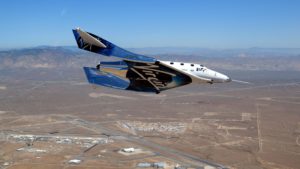
Virgin Galactic, the private spaceflight company founded by Virgin Group chairman Sir Richard Branson achieved success on 13 December 2018 after its SpaceShipTwo Unity (VSS Unity) reached suborbital space for the first time over the Mojave Desert in California, United States.
VSS Unity reached an altitude of 82.7 kilometres near the edge of space, and the two pilots of the craft – pilot Mark Stucky and co-pilot Frederick “C.J.” Sturckow – will be awarded astronaut wings by the U.S. Federal Aviation Authority (FAA) at a ceremony to be held in Washington, DC, at a later date.
There has been some skepticism in some circles, however, as a number of critics have pointed out that the 82.7km altitude reached by VSS Unity is not technically space since the Karman Line at 100km altitude is commonly regarded as the point at which the Earth’s atmosphere ends and outer space begins. This said, both the FAA and the U.S. Air Force regard the altitude of 80km as worthy of astronaut status.
The VSS Unity flight also carried four scientific payloads provided by the NASA Flight Opportunities Programme, marking the VSS Unity flight as not only Virgin Galactic’s first foray into near space, but also its first revenue-generating mission.
“Many of you will know how important the dream of space travel is to me personally. Ever since I watched the moon landings as a child I have looked up to the skies with wonder. We started Virgin nearly 50 years ago dreaming big and loving a challenge. Today, as I stood among a truly remarkable group of people with our eyes on the stars, we saw our biggest dream and our toughest challenge to date fulfilled. It was an indescribable feeling: joy, relief, exhilaration and anticipation for what is yet to come,” said Sir Richard Branson after VSS Unity safely landed.
“Today, for the first time in history, a crewed spaceship, built to carry private passengers, reached space. Today we completed our first revenue generating flight and our pilots earned their Commercial Astronaut Wings. Today, we have shown that Virgin Galactic really can open space to change the world for good. We will now push on with the remaining portion of our flight test program, which will see the rocket motor burn for longer and VSS Unity fly still faster and higher towards giving thousands of private astronauts an experience which provides a new, planetary perspective to our relationship with the Earth and the cosmos. This is a momentous day and I could not be more proud of our teams who together have opened a new chapter of space exploration,” Sir Richard added.
“What we witnessed today is more compelling evidence that commercial space is set to become one of the twenty-first century’s defining industries. Reusable vehicles built and operated by private companies are about to transform our business and personal lives in ways which are as yet hard to imagine. New enterprises are being created which will become hugely valuable, while enabling humanity to better manage some of its greatest future challenges. Today was a remarkable achievement brought about by the skill, dedication and support of our shareholders, staff, customers, partners and many other stakeholders. We extend our congratulations and thanks to each and every one of them,” said George Whitesides, CEO of Virgin Galactic and the SpaceShip Company.
For one of the UAE’s sovereign wealth funds, the successful flight into near space by VSS Unity validates a significant investment into Virgin Galactic made by one of its investment arms – Aabar Investments PJS – in 2009 and 2011. Aabar Investments – part of Mubadala – initially made an investment of U.S.$280 million into Virgin Galactic in 2009, giving it a 31.8 per cent stake in its holding company. In 2011 this stake was increased by a further six per cent (to a total of 37.8 per cent) with an additional investment of U.S.$110 million.
As part of these investments into Virgin Galactic by Aabar Investments, the two entities are examining Al Ain – a city in the interior of the UAE – as a possible spaceport for future Virgin Galactic SpaceShipTwo space tourism and satellite launch flights.
 SpaceWatch.Global An independent perspective on space
SpaceWatch.Global An independent perspective on space




